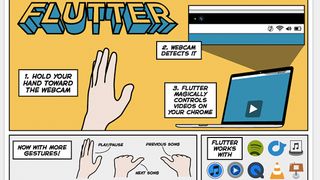Google waves hello to gesture controls with Flutter acquisition
Flutter owners can add the cha-ching gesture to their daily motions

Flutter was able to use its "Kinect for OS X" gesture recognition technology to flag down a deal with Google, the two companies announced today.
The Flutter app on Mac and Windows enables users to control a number of programs like iTunes, Spotify and PowerPoint with simple gestures using a computer's built-in webcam.
Installing the Chrome extension also adds YouTube, Pandora, Grooveshark and Netflix support to Flutter's array of motion controls.
The company planned to go beyond the app's basic "previous," "skip to next," and "pause" motion controls, and now it may be at the Google campus in Mountain View, Calif.
"Today, we are thrilled to announce that we will be continuing our research at Google," wrote Flutter CEO Navneet Dalal on the company's official site today.
"We share Google's passion for 10x thinking, and we're excited to add their rocket fuel to our journey."
Google is 'really impressed' with Flutter
Google's acquisition is a sign that the company may be interested in Kinect-like motion controls for its own products.
Are you a pro? Subscribe to our newsletter
Sign up to the TechRadar Pro newsletter to get all the top news, opinion, features and guidance your business needs to succeed!
"We're really impressed by the Flutter team's ability to design new technology based on cutting-edge research," a Google spokesperson told TechRadar.
"We look forward to supporting and collaborating on their research efforts at Google."
Google wasn't ready to announce what the Flutter team is working on next. But at least users who downloaded the app for Mac, Windows and Chrome can stay put by continuing to use it.
Android superpowers?
The Flutter app was designed with a comic book theme that intended to make users "feel like a superhero." But its powers were limited to Mac OS X and Windows computers.
Flutter could open the floodgates for Android gesture controls using the existing front-facing cameras found in most Google-powered phones and tablets.
The company told GigaOm last year that it wanted to give machines eyes and make them aware of users.
Dalal asked pointed questions like "Why wouldn't a computer automatically lock its screen once you move away from your desk?" and "And why shouldn't your phone recognize whether you're smiling or having a bad day?"
Flutter could make new waves like this beyond its superhero origins as a new sidekick to Google.
- Read our Nexus 7 review for our take on Google's newest tablet.

